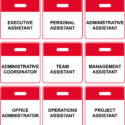
Hiyam Abuguilah, author of Be an Exceptional Administrative Assistant, explains how organisations lose momentum when they fail to realise their employees’ potential
Recently, I read a powerful online article that introduced me to information I had never encountered before. The article suggested that every individual possesses 34 distinct strengths and that most people operate in a professional world that rewards the visible five or six, leaving the rest dormant.
Each of us, therefore, has potential far broader than what we show at work. This is especially true in the case of administrative professionals.
Administrative roles are often narrowly defined, centered on calendar management, correspondence, and coordination. These functions are critical, but they only scratch the surface of what many administrative professionals can offer. Beneath the surface, there is often a deep capacity for systems thinking, operational insight, stakeholder management, and quiet leadership.
The issue lies not in the lack of ability, but in the limitations imposed by routine expectations and legacy mindsets. When roles are defined too rigidly, people adapt to the container they are given. Over time, even high-potential individuals may begin to self-limit, believing that their worth lies only in the tasks they perform, not in the ideas they could contribute or the influence they could wield. This is where organizations lose momentum: not because they lack talent, but because they fail to recognize it.
The administrative role is not small. It’s simply waiting for a wider lens. And the moment we begin to see it that way, we unlock not only individual growth but organisational transformation.
Gallup research shows that when people are encouraged to use their full range of strengths, their engagement and performance significantly increase (Gallup, 2020). However, many organizational cultures still operate with static job descriptions that leave little room for evolution, especially in roles perceived as “support.”
In reality, support roles often sit at the heart of complex operations. Administrative professionals are exposed to decision-making dynamics, confidential strategy sessions, and frontline problem-solving. With the right encouragement and access, they are uniquely positioned to influence outcomes beyond their titles.
Unfortunately, without visibility or advocacy, many administrative professionals internalize the idea that their capabilities stop where their job description ends. This mindset is costly, not only to their careers but to the organizations they serve.
A Harvard Business Review article warned that companies often underestimate their own talent by overvaluing formal roles and undervaluing hidden competencies. When strengths go unused for too long, they begin to fade, not from lack of existence, but from lack of use.
So, what can be done?
First, shift how managers and organizations talk about the role and potential of administrative professionals from a narrow focus on tasks to a broader recognition of talents, strengths, and strategic value.
Second, rethink development. Training programs for administrative professionals must extend beyond the basics. Modules on strategic communication, project management, and change leadership are not “nice to have”; they are core.
Finally, shift the mindset. To every administrative professional reading this: Your title doesn’t define your potential. Your strengths don’t require permission to exist. If you’ve been working from the same narrow toolbox for years, it’s time to open the rest of the kit.













